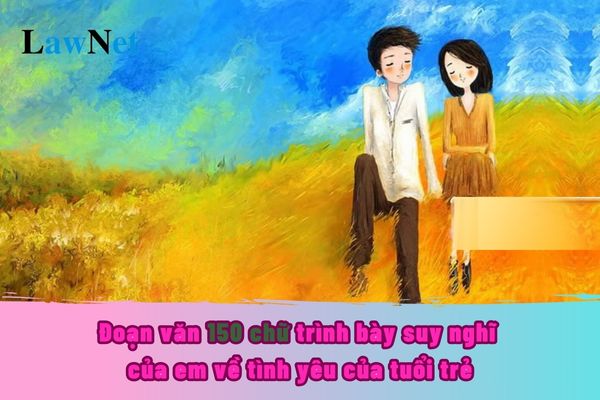Vietnam: What are the sample 150-word essays showing thoughts about the love of youth in today's society?
What are the sample 150-word essays showing thoughts about the love of youth in today's society?
Students are encouraged to refer to the following sample 150-word essays showing thoughts about the love of youth in today's society:
|
Sample 150-word essays showing thoughts about the love of youth in today's society Sample 1: Love in the digital age |
Note: Information is for reference only.

What are the sample 150-word essays showing thoughts about the love of youth in today's society? (Image from the Internet)
What are the requirements regarding patriotism of upper secondary school students in Vietnam?
Under the General Education Program issued along with Circular 32/2018/TT-BGDDT, the requirements regarding the five key traits of upper secondary school students under the 2018 General Education Program are as follows:
(1) Patriotism
- Actively and proactively encourage others to participate in activities protecting nature.
- Voluntarily carry out and encourage others to comply with legal regulations, contributing to the protection and construction of the Socialist Republic of Vietnam.
- Actively and proactively participate in and encourage others to partake in activities that protect and promote the values of cultural heritage.
- Fight against schemes and actions that infringe on territorial, border sovereignty, and sovereign rights of the nation with attitudes and actions appropriate to the age and legal regulations.
- Be ready to fulfill the obligation to defend the Fatherland.
(2) Mercy
Love everyone
- Care about harmonious relationships with others.
- Respect the legal rights and interests of everyone; fight against acts infringing on the legal rights and interests of organizations and individuals.
- Actively and proactively encourage others to participate in charity activities and community service activities.
Respect for differences among everyone
- Respect differences in career choices, living circumstances, and personal cultural diversity.
- Be conscious of learning about world cultures.
- Be sympathetic and forgiving of the faults in others' behaviors and attitudes.
(3) Diligence
Love learning
- Evaluate personal strengths, weaknesses, advantages, and challenges in learning to construct a study plan.
- Actively explore and innovate in learning; strive to overcome difficulties to achieve good learning outcomes.
Love working
- Actively participate in and encourage others to engage in community service works.
- Persevere to achieve good results in labor.
- Actively study and train in preparation for future careers.
(4) Honesty
- Perceive and act according to reason.
- Willingly fight to defend justice, protect good people and good things.
- Voluntarily participate in and encourage others to engage in detecting and combating dishonest behaviors in both learning and life, violations of moral standards, and legal regulations.
(5) Responsibility
Be responsible for oneself
- Actively, voluntarily, and seriously cultivate personal ethics.
- Be mindful of reasonable money management in dining, purchasing study and living necessities.
- Be ready to take responsibility for one's words and actions.
Be responsible for the family
- Be conscious of fulfilling duties towards relatives and family.
- Discuss and collaborate with family members to build and implement a reasonable spending plan.
Be responsible for school and society
- Actively participate in and encourage others to engage in public service activities.
- Actively participate in and encourage others to join in legal education activities.
- Assess one's and others' compliance with discipline and laws; criticize undisciplined behaviors and legal violations.
Be responsible for the living environment
- Understand the importance of saving for sustainable development; have a consciousness for saving natural resources; combat against reckless, wasteful use of materials and resources.
- Actively participate in and encourage others to partake in activities promoting awareness, caring for, protecting nature, and responding to climate change and sustainable development.
Must the general education program in Vietnam ensure students self-adjust according to general social norms?
Under Section 2 of the General Education Program issued by the Minister of Education and Training along with Circular 32/2018/TT-BGDDT (amended by Clause 1, Article 1 Circular 13/2022/TT-BGDDT) as follows:
- The general education program concretizes general educational goals, helping students master general knowledge, effectively apply acquired knowledge and skills to life, and self-study for life, with career orientation in mind, build harmonious social relationships, possess character, personality, and a rich spiritual life, thereby having a meaningful life and contributing positively to the development of the country and humanity.
- The primary education program helps students form and develop basic elements laying the foundation for harmonious physical and mental development, traits, and capacities;
The main emphasis is on education about personal, family, and community values, and the habits and routines necessary for learning and living.
- The lower secondary education program helps students develop traits and capacities that were formed and developed at the primary level, self-adjust according to general social norms, apply active learning methods to consolidate foundational knowledge and skills, gain initial understanding of various careers, and have career orientation awareness to pursue further education in high school, vocational training, or engage in labor activities.
- The upper secondary education program continues to help students develop the necessary traits and capacities required for workers, citizenship awareness, the ability to self-study and lifelong learning, and make appropriate career choices based on capabilities and interests, conditions, and personal circumstances for further study, vocational training or participating in labor activities, capable of adapting to changes in the context of globalization and new industrial revolution.
Thus, one of the necessary contents when developing the Literature curriculum is to ensure students self-adjust according to general social norms.
See the General Education Program issued by the Minister of Education and Training along with Circular 32/2018/TT-BGDDT: Download (Note: Some content in this file is amended by Article 1, Article 2 Circular 13/2022/TT-BGDDT).

